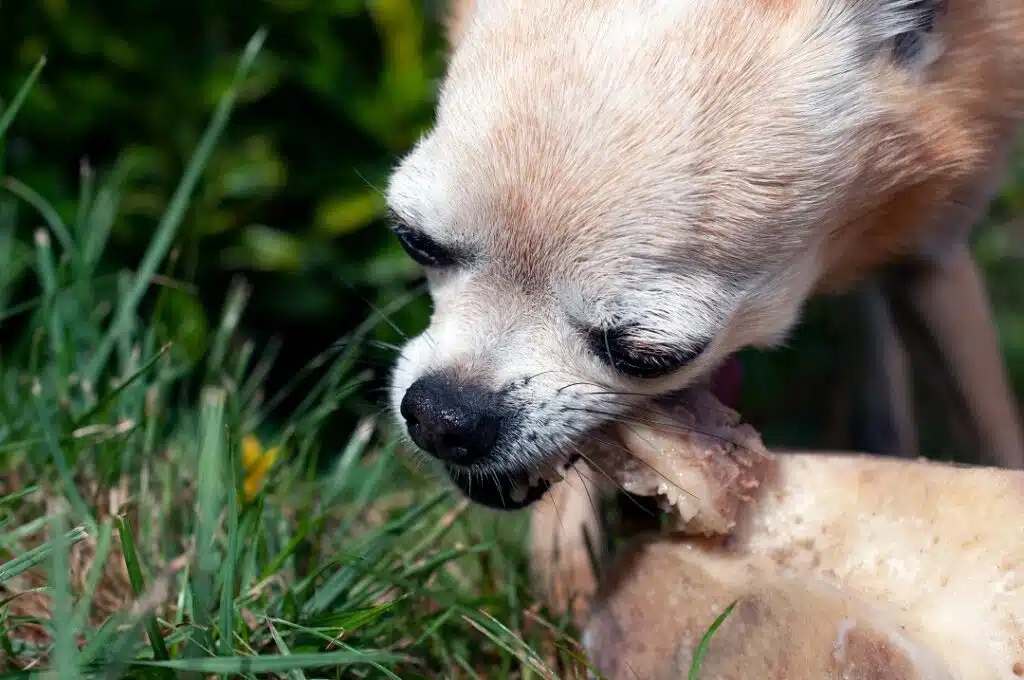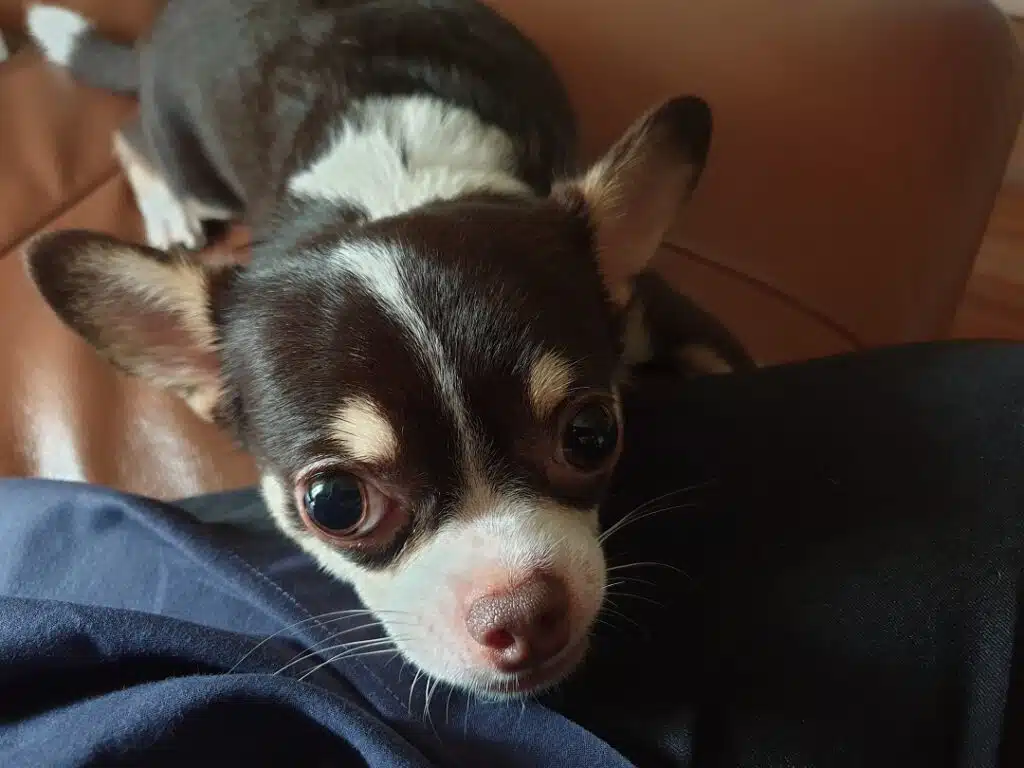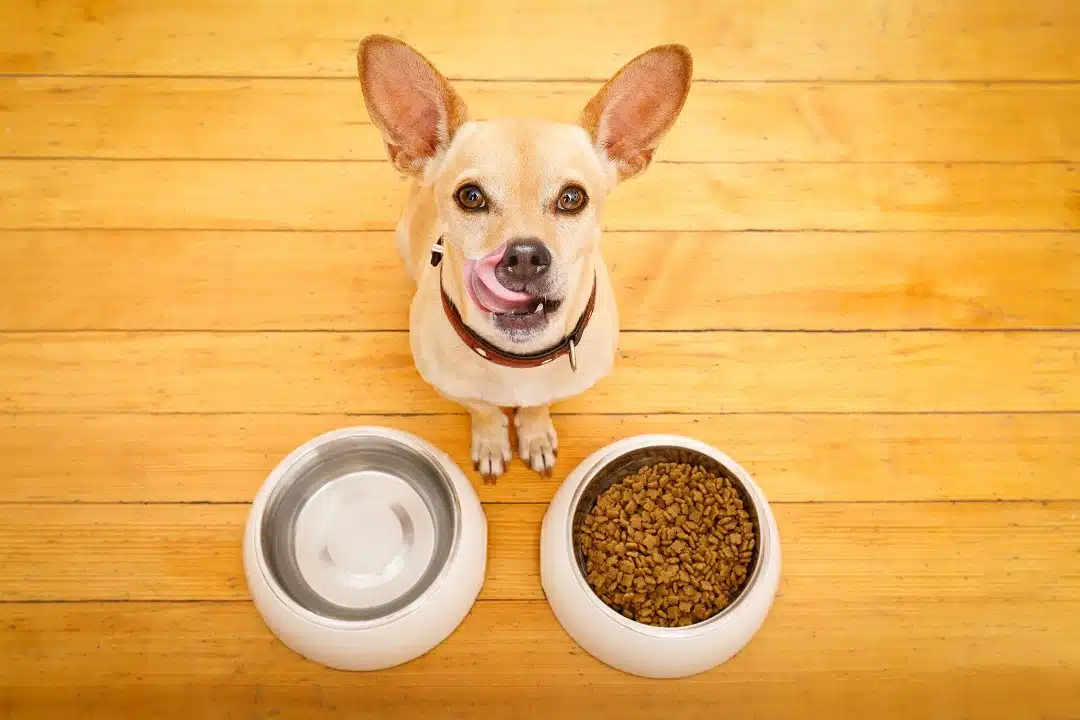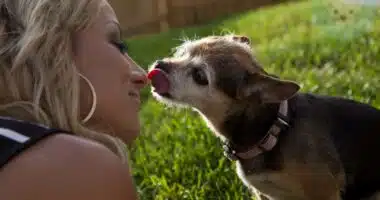1. Type of Food
When a dog eats and eats without ever feeling satisfied and full, this is often due to the type of food that he is ingesting. If he is being given a very low-quality food that is packed with cheap filler, he is not actually receiving enough ‘real’ food and that can be a major problem. Reassess what you are giving to him. Switching to a better quality brand can make a huge difference, as your Chihuahua will actually become full after a meal.
You can check the rating of any brand of food here: Dog Food Advisor – Check food rating. It lists out just about every brand of dog food, gives you it’s a rating (1 through 5 stars) and tells you exactly why it was rated as so.
2. Increased Activity
Just like humans, when a dog burns more calories, the body requires more fuel. Some owners may not even realize that there has been an increase in exercise or other activities. This change usually occurs for those that live in areas that experience a change in season. During warmer months with pleasant temperatures, dogs are walked, brought out to dog parks and taken along with owners to run errands more often. If your Chihuahua is exercising more, it is perfectly okay for him to have a higher appetite.

3. Weather
Canines tend to eat less during hot summer months and more during colder winter months. Sometimes an owner may not notice the decrease in the summer, but the heartier appetite during the winter is very apparent. These seasonal fluctuations are very normal and over the course of a year it all evens out.
4. A Need for Water
There can be an increased hunger if a dog is not drinking enough water. Since all foods contain water, a dog may eat if that is his only option to hydrate. Be sure to keep clean, cool water available at all times. Bring water with you when you are exercising your Chihuahua in a 2-in-1 travel container (the lid is the bowl) or with a collapsible bowl.
5- The Need to Chew

If a puppy is teething he can have an insatiable need to chew and this can often present as eating more food, especially if he is being fed kibble that is crunchy and offers a comparable comfort as chew toys do. Offer ice cubes – plain or flavored – which are low or no-calorie alternatives that allow for some great, crunchy chewing without the ingestion of added food. Proper teething toys that are rotated will help as well.
With adult Chihuahua that seems to always be hungry, this may be due to anxiety or stress that presents as a nervous chewing habit leading to the consumption of extra food. All sorts of situations can cause a dog to feel stress. The top reasons are: being left home alone, a change in human family members (a new baby in the house or a family member has moved out) or transitioning to a new home. For adults that suffer from separation anxiety, take steps to help him with this.
If a dog is stressed and eating too much due to a change in environment, time is the best fix for this. It is not uncommon for dogs to suffer from depression due to the loss of a family member, either animal or human. Offering quality time with new and interesting activities can help, which would include bringing a dog to a new place that he has never visited before (lake, different dog park, pet store, etc.)
6. Health Conditions
There are a few medical issues that can cause a dog to overeat and gain weight.
These are also possibilities if a Chihuahua is eating a lot but is still skinny:
• Cushing’s syndrome – A malfunction of the adrenal glands causes an overproduction of the cortisol hormone. While increased appetite is 1 sign of this, other signs and symptoms are much more apparent: Fur loss, a darkening of the skin, increased thirst (and subsequently increased hunger if the water not available), a distended stomach, weakness, and loss of muscle mass.
• Canine diabetes – During the onset of diabetes, insulin-related tumors can cause an increase in appetite. With this disease, there can a dog may eat a lot but lose weight.
• Exocrine pancreatic insufficiency – This is rare with the Chihuahua breed (90% of all cases involve German Shepherds and the Rough Coated Collie), however, it is a condition in which there are not enough enzymes being created to properly digest food. The food then passes out of the body before nutrients can be absorbed and this causes a dog to always be hungry.
• Bacterial overgrowth – With this issue, there is an overgrowth of bacteria in a dog’s small intestine, which causes damage that results in nutrients from food not being absorbed. In turn, a dog becomes very hungry and eats more without gaining weight.
• Worms – If a dog has worms, he may eat a lot by still be skinny. Your vet can inspect for worms by examining a stool sample and this can be treated with proper de-worming medication.

7. Behavioral/Conditioning Issues
In some cases, owners may not realize that their Chihuahua eats too much only because extra food is being offered too often. It’s a trap that owners can fall into without realizing it. You’re cooking dinner; your Chihuahua just ate but is looking at you with those puppy dog eyes. You give in and feed him a bite of your food. You wonder, “How can my Chihuahua eat so much?’ but what’s really happening is that a satiated dog is tempted by the smells and sight of food and will rarely turn down an offering even if his stomach is full.
This sort of habit can easily be corrected by sticking to a strict feeding schedule and not offering any food except during meal and snack times. Your Chihuahua may miss the attention, however, the extra food can easily be substituted with pats, kisses and perhaps a few minutes of playtime.






